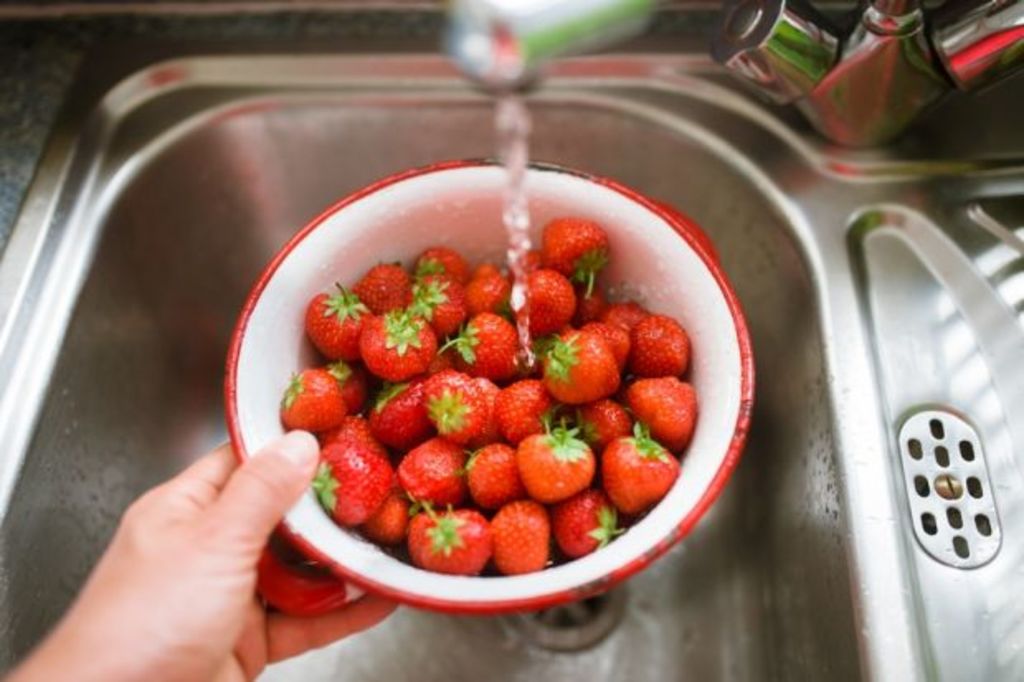How to clean your kitchen: 12 cleaning mistakes that make food taste worse

Did you ever think of how tonight’s cleaning efforts can affect tomorrow’s dinner? Be sure you don’t make these common kitchen cleaning mistakes.
1. You throw your cast-iron skillet in the dishwasher
This strips the seasoning off the pan. The seasoning stops food from sticking – so washing it away can cause your next dish to cook unevenly.
Instead, rinse with hot water and a small amount of detergent while the pan is hot. Then cover with a layer of coarse salt (so it becomes a paste) and scrub with a sponge. Wipe out most of the water with a paper towel, then leave to dry over a low flame on the stovetop to stop it from rusting – about 5 minutes. Let it cool, and to keep it moisturised, rub with a bit of oil.
2. You don’t clean your coffee grinder
As you grind, coffee beans release fragrant oils – this is what creates that amazing aroma. Yet stale grounds can easily turn rancid, affecting the taste of your next cup of joe.
If you’re passionate about your morning coffee, make sure you wash your grinder properly. Try whizzing uncooked rice or stale bread to dislodge any crusty bean debris, then wash with water and a bit of detergent. If your grinder is particularly smelly, deep clean with white vinegar, but make sure you rinse it out thoroughly when you’re done.
3. You don’t clean your grill
Don’t try to convince yourself that those charred black bits add flavour – they can transfer onto fresh foods and ruin the taste, while also spreading harmful bacteria.
The next time you BBQ, try scrubbing each grill grate with crinkled aluminium foil while it’s still warm.
4. You don’t clean your baking trays properly
The same principle applies to your baking trays. Try mixing lemon and baking soda and rubbing it into any burnt areas. Give it a few good minutes then rub away with the back of a wooden spoon. The burnt particles should lift without too much elbow grease. Once done, wash with hot water and detergent as usual.

Don’t throw your cast-iron skillet in the dishwasher. Photo: Stocksy
5. You don’t wash your tupperware immediately
Are there traces of your last meal in your tupperware, despite the fact you just cleaned it? Pour in white vinegar – straight – and give it a shake. Leave overnight and rinse. And don’t worry about waste – you can also reuse this vinegar to clean out other containers.
6. You don’t rinse properly
With everything you clean – especially glassware – make sure you rinse it out thoroughly to prevent any off-tastes caused by heavily fragranced detergent.
7. You don’t clean your oven
Thick and greasy food bits become even more baked-on with subsequent cooking and emit odours that impact the taste of other food you put in there. The self-cleaning feature cranks the heat right up – likely setting off your smoke alarm or even causing heat damage to your oven’s control board – so the best way to clean is to do it yourself.
Start by mixing ½ cup of bicarb soda with water to form a paste. Remove the oven racks and spread it over the interior of your oven – avoiding any heating components. Allow it to sit overnight. In the morning, use a damp rag to remove the paste. Then spray white vinegar onto any remaining gunk. This should foam, causing the build-up to wipe right off.

Make sure you rinse all of your dishes thoroughly before washing. Photo: Stocksy
8. You’re not placing utensils in your dishwasher correctly
Do you ever unload your dishwasher to find food particles caked onto your spoons, forks and knives? This may be because your utensils are being nestled together, preventing the spray from reaching them. The next time you load your dishwasher, have your utensils face outward – away from each other – to ensure they get a good clean.
9. You’re tossing certain kitchen tools in the dishwasher
Things like garlic presses should be hand-washed. Garlic is sticky and may get stuck in the crevices after you use it. Tossing it in the dishwasher causes these bits to dry in the holes, so your garlic press won’t work as well in the future.
10. You’re not scrubbing your chopping boards
Rid them of lingering smells – and germs you can’t see – by washing your wooden boards properly. Sprinkle them with table salt, then scrub down with half a lemon. The grains should penetrate into the wood grain, leading to a cleaner board. Finish by washing with hot, soapy water and leave to dry completely before putting away.

Cleaning your fridge and freezer at least every three months is best practice. Photo: Stocksy
11. You’re not cleaning your fridge and freezer regularly
At least every three months is best practice, but you should know it’s time when your food (or ice cubes) start to get a fridge or freezer taste to them.
Take out shelves and drawers, then wipe down and deodorise with white vinegar or lemon juice. Nix bad smells by placing an open box of bicarb soda in the fridge and freezer to absorb odours. (When it’s time for your next fridge clean, simply pour the bicarb soda down the sink with a white vinegar chaser to give your drains a refresh.)
12. You’re not cleaning blades separately
Cleaning blenders, food processors and electric can openers by swishing around warm water and detergent isn’t enough – food particles will inevitably remain. After you’re done blitzing, you have to remove the blades and wash them separately to prevent gunk (and bacteria) build-up.
We recommend
States
Capital Cities
Capital Cities - Rentals
Popular Areas
Allhomes
More







